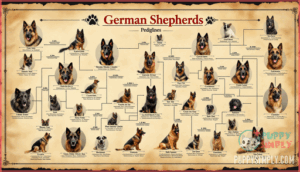This site is supported by our readers. We may earn a commission, at no cost to you, if you purchase through links.

The average cost of buying a German Shepherd varies dramatically based on factors most buyers don’t even know to ask about. Some price differences reflect real value—health testing, proper socialization, quality bloodlines. Others are just markup. Understanding what drives these costs helps you spot which breeders are worth their asking price and which are overcharging for mediocre dogs.
Table Of Contents
- Key Takeaways
- Purebred Vs. Crossbred Dog Prices
- Adoption Vs. Buying From a Breeder
- German Shepherd Price Range
- Factors Affecting German Shepherd Price
- Reputable Breeder Expenses
- Supply and Demand
- Popularity and Availability
- Purebred Vs. Crossbred
- Health Testing and Screening
- Training and Socialization
- Show Quality Vs. Pet Quality
- Age of The Puppy
- Location and Breeder Reputation
- Coat Color and Markings
- Pedigree and Bloodline
- Breeder’s Experience and Expertise
- Current Market Trends
- Time of Year and Seasonality
- Special Offers and Discounts
- Additional Costs and Considerations
- Budget and Financial Planning
- Frequently Asked Questions (FAQs)
- How much does a German Shepherd puppy cost?
- How much does a German Shepherd puppy cost in 2025?
- Why are German shepherds so expensive?
- Should I buy a German Shepherd?
- How much does it cost to adopt a German Shepherd?
- Is a German Shepherd breeder overcharging a lot?
- Is it possible to find a German Shepherd puppy for under $500?
- What is the average lifespan of a German Shepherd?
- Are there any specific health conditions that German Shepherds are prone to?
- What health issues are common in German Shepherds?
- Conclusion
Key Takeaways
- German Shepherd prices vary dramatically ($200–$3,500+) based on breeder reputation, health testing, location, and bloodline quality, so cheaper doesn’t mean better value.
- Reputable breeders invest ($500–$2,000 per litter) in genetic screening, veterinary care, and socialization, which justifies higher upfront costs by preventing thousands in future vet bills.
- Adoption from rescues ($250–$600) offers a budget-friendly alternative with lower costs and immediate companionship, while also helping dogs in need.
- Long-term ownership costs ($47,000–$99,000 over 10–13 years) when accounting for food, vet care, grooming, training, and emergency expenses beyond the initial purchase price.
Purebred Vs. Crossbred Dog Prices
Choosing between a purebred and crossbred German Shepherd isn’t just about picking a dog—it’s about understanding what you’re paying for. Purebreds follow strict breed standards and cost $600 to $2,500, reflecting their documented lineage and predictable traits. Crossbreds or German Shepherd mixes usually run $200 to $800.
These mixed breed dogs often benefit from hybrid vigor—better genetic diversity that can mean fewer inherited health problems. While purebreds offer consistency in appearance and temperament, crossbreds bring breed health advantages through their varied genetics.
Your choice comes down to whether you value pedigree standards or the ethical considerations and potential resilience that come with genetic diversity.
Adoption Vs. Buying From a Breeder
Once you’ve decided between purebred and crossbred, your next big decision is whether to adopt from a rescue or buy from a breeder. This choice affects both your initial investment and ethical considerations.
| Factor | Adoption | Breeder |
|---|---|---|
| Cost | $300-$600 | $500-$3,000+ |
| What’s Included | Vaccinations, spay/neuter often done | Health guarantee, lineage documentation |
| Background | May be unknown | Traceable pedigree |
| Wait Time | Often immediate | Weeks to months |
Adoption fees cover basic care and help curb shelter overpopulation. You’ll give a German Shepherd in need a second chance while saving money. Reputable breeders following breeder standards charge more but provide health testing, socialization, and ongoing support. They avoid puppy mills through transparent practices.
Rescue benefits include immediate companionship and lower costs, but you might not know the dog’s full history. Breeders offer predictability but require patience and deeper pockets.
German Shepherd Price Range
German Shepherd prices swing from around $200 to over $3,500, depending on where you look and what you’re after. Pet-quality puppies from responsible breeders usually fall between $800 and $2,500. Show-quality dogs can reach $4,000 or more, especially from champion bloodlines. Location matters too. In the Midwest, you might pay $800 to $2,200 for a puppy, while the West Coast can push prices toward $3,500.
This Initial Purchase Price is just the starting point. Long-Term Expenses like food, vet care, and grooming add thousands over your dog’s lifetime. A typical German Shepherd puppy can cost between $1,200 and $3,500.
Understanding these Factors Affecting German Shepherd Price helps you see the Investment Perspective clearly and plan for Unexpected Costs down the road.
Factors Affecting German Shepherd Price
When you’re shopping for a German Shepherd, you’ll quickly notice that prices are all over the map. The sticker shock can range from a few hundred bucks to several thousand dollars, and it’s not random.
Understanding what drives these price differences helps you budget smarter and know what you’re actually paying for.
Breeder Expenses Impact Price
Your breeder’s behind-the-scenes costs shape what you’ll pay. Reputable breeders invest $500 to $2,000 per litter in veterinary care, feeding, and socialization. Genetic screening runs $120 to $350 per dog, while facility costs and training programs add up quickly. These dog breeding costs directly affect pricing—breeders performing full health screenings charge 15–30% more than those who skip these steps.
That’s why a breeder’s experience and expertise matter when you’re evaluating factors affecting German Shepherd price. Initial purchase costs matter when acquiring a German Shepherd.
Purebred Vs. Crossbred Cost
Purebred vs crossbred dog prices differ sharply. Purebred status increases your average cost by 20–35% relative to crossbreds. AKC-registered puppies command 28% higher prices than those without registration. German Shepherd mixes offer genetic diversity and hybrid vigor at lower costs, but you’ll sacrifice breed standards and predictability.
Purebred vs Crossbred Comparison:
- Purebred German Shepherds cost $2,000–$3,500 for show or working lines
- Pet-quality purebreds range from $800–$1,500 with registration
- German Shepherd mixes generally cost $300–$800 from breeders
- Designer breeds (intentional crosses) may reach $1,200–$2,000
- Health risks vary—purebreds face breed-specific issues while crossbreds benefit from genetic diversity
Adoption as Alternative
Instead of buying from a breeder, you might want to explore adoption as a practical way to bring home a German Shepherd while helping a dog in need. German Shepherd rescue organizations generally charge adoption fees between $250 and $600—far less than breeder prices. The adoption process involves applications, home checks, and matching you with a suitable dog. Shelter environments provide basic care, vaccinations, and health screenings before adoption. Second chances benefit both you and the dog through lower costs and the satisfaction of rescue.
Benefits of Dog Adoption:
- Lower upfront costs—adoption fees cover spaying, neutering, and initial vet care
- Adult dogs available—skip the demanding puppy phase with trained, calmer companions
- Known temperaments—rescue staff assess behavior and provide detailed histories
- Supporting animal welfare—reduce shelter overpopulation while saving a life
- Trial periods offered—many rescues allow fostering before finalizing adoption
Reputable Breeder Expenses
Behind every puppy price tag sits a breeder who’s already spent months—and thousands of dollars—preparing that little furball for you. Reputable breeder expenses start with genetic testing to screen out hereditary problems that could cost you big down the road.
Healthcare costs pile up fast with vaccinations, deworming, and regular vet checkups for both parents and puppies. Stud fees for quality bloodlines can hit several thousand dollars alone. Then there’s facility maintenance—clean kennels, climate control, and safe play areas don’t run themselves.
Ethical practices mean proper nutrition, early socialization, and individual attention for each pup. These expenses directly influence German Shepherd prices, but they’re also your insurance policy against heartbreak and unexpected bills later.
Reputable breeders invest heavily in ethical practices—proper nutrition, early socialization, and health testing—creating an insurance policy against heartbreak and unexpected veterinary bills later
Supply and Demand
Puppy prices swing like a pendulum based on how many are available versus how many people want them. When German Shepherd demand surged during the early 2020s, prices climbed steadily. By 2024, market demand dropped by nearly two-thirds, yet regional imbalances still create price volatility.
Here’s how supply and demand affects what you’ll pay:
- Regional fluctuations mean Northeast buyers face $1,200-$3,000 tags while Midwestern breeders charge $800-$2,200 for similar puppies.
- Seasonal demand peaks in spring and summer when families want puppies, driving prices up 15-25% during those months.
- Economic effects force breeders to reduce litters during downturns, tightening supply and maintaining higher baseline costs.
Breeder limitations—including strict health testing requirements and annual litter caps—keep supply controlled even when demand shifts.
Popularity and Availability
German Shepherds consistently rank among America’s most-loved breeds, but that fame comes with trade-offs. High breed popularity means you’ll find puppies in most regions, yet market saturation varies drastically. Urban areas often have breeder demand that outpaces supply, creating waiting lists of 3-6 months.
| Factor | Impact on Cost |
|---|---|
| High regional availability | Lower puppy prices ($800-$1,500) |
| Limited local breeders | Higher prices ($2,000-$3,500+) |
| Seasonal demand peaks | 15-25% price increases |
Your location determines whether you’ll pay premium prices or find reasonable options. Rural Midwest breeders generally have better availability and lower German Shepherd costs compared to coastal cities where waiting lists stretch longer and dog prices climb higher.
Purebred Vs. Crossbred
Choosing between a purebred and crossbred German Shepherd is like picking between a classic novel and a fresh remix—both have their merits, but the right choice depends on what you value most.
Purebred German Shepherds follow strict breed standards that give you predictability. You’ll know what size, temperament, and appearance to expect. These dogs usually cost more upfront—ranging from $1,500 to $3,500—but offer documented genetic health testing and proven lineage.
Crossbreds blend German Shepherd traits with another breed, creating unique combinations. German Shepherd mix prices start lower at $500 to $1,200, making them budget-friendly. The temperament differences can surprise you since crossbreds inherit traits from both parents.
| Factor | Purebred German Shepherds | Crossbreds |
|---|---|---|
| Initial Investment | $1,500-$3,500+ | $500-$1,200 |
| Genetic Health | Documented screening available | Less predictable |
| Temperament Differences | Consistent with standards | Varied traits |
| Long-Term Value | Breeding rights possible | Lower resale |
| Breed Standards | AKC registered | No registration |
Purebred vs mixed breed dogs each have a place. Your lifestyle and budget determine the winner.
Health Testing and Screening
Before choosing your next German Shepherd, you should understand how health testing affects price. Breeders who prioritize genetic predispositions invest heavily in screening costs—averaging $902 for hip and elbow certification alone, plus $65 for eye exams. These breed-specific health screenings directly impact what you’ll pay upfront, but they protect you from expensive surprises later.
Here’s what responsible breeders test for:
- Hip and elbow dysplasia screening – 79% of tested German Shepherds since 2021 showed clear hips, while 81% had healthy elbows.
- Degenerative myelopathy genetic testing – Only 67% test completely clear for this debilitating condition, making early detection critical.
- Eye disease examinations – 95% of screened dogs show no ophthalmological problems when properly evaluated.
- Cardiac and thyroid panels – About 6% show heart abnormalities and 8% display thyroid issues in OFA data.
Testing prevalence varies widely between breeders. You’ll find that puppies from health-tested parents cost $500 to $1,500 more than untested litters, but breeder responsibility means fewer vet bills down the road. German Shepherd health screenings aren’t just paperwork—they’re your insurance policy against heartbreak and financial strain.
Training and Socialization
Beyond health screenings, what breeders do with your puppy before you bring it home can add $200 to $1,000 to the price. Professional trainers charge between $30 and $80 per hour for early socialization and obedience training, and responsible breeders cover these costs before you ever meet your German Shepherd.
Early socialization starts at three weeks old. Your puppy gets exposed to different sounds, textures, and people during critical development windows. This prevents behavioral issues later—like fear aggression or separation anxiety—that cost thousands to fix.
Basic puppy socialization includes touch exercises and environmental exposure. Further training covers crate training, leash manners, and simple commands. Some breeders hire professional trainers for structured dog training programs, which explains why their puppies cost more. You’re not just buying a German Shepherd—you’re investing in a well-adjusted companion who won’t need expensive behavior modification down the road.
Show Quality Vs. Pet Quality
Once your puppy’s had the right training and socialization, you’ll need to decide whether you want a dog bred for the show ring or just a loyal family companion—and that choice can swing the price by thousands of dollars.
Show-quality German Shepherds meet strict conformation standards set by breed registries. These dogs have champion bloodlines and near-perfect physical traits—correct angulation, ideal gait, and proper coat texture. Pet-quality puppies might have minor flaws like slightly misaligned teeth or coat color variations that won’t affect health but disqualify them from competition.
| Category | Show-Quality Dogs | Pet-Quality Dogs |
|---|---|---|
| Price Range | $2,000–$3,500+ | $800–$1,500 |
| Pedigree Requirements | Champion bloodlines with documented lineage | Standard purebred registration |
| Training Requirements | Extensive ring preparation | Basic obedience and socialization |
The investment potential varies greatly. Show-quality German Shepherds justify higher prices through their breeding value and temperament differences that make them excel in competitive environments.
Age of The Puppy
Whether you’re eyeing a show dog or a pet-quality companion, the puppy’s age will also play a big role in what you pay. Most breeders sell German Shepherd puppies between 8 and 12 weeks old—that’s when puppy cost usually peaks. You’re paying for essential early socialization work and health screenings during this critical window.
Puppies older than four months often cost less because their socialization window has narrowed and training readiness becomes your responsibility. Adolescent dogs between six months and a year may drop another $200 to $500 in price. The maturity impact works both ways though. Very young puppies under seven weeks shouldn’t leave their mother—any breeder selling them that early is cutting corners.
Age affects more than just the price tag. Older puppies need immediate training investment, while younger ones give you more control over their development from the start.
Location and Breeder Reputation
Where you buy your German Shepherd matters just as much as what you’re buying. Breeders in high-demand urban areas often charge more than those in rural locations where Local Market Prices stay lower. Regional Demand shifts costs too—German Shepherd breeders in the Northeast and West Coast generally price puppies $500 to $1,000 higher than Midwest kennels.
Breeder reputation directly affects your wallet. Finding German Shepherd breeders with proven Breeder Ethics and decades of Breeders Experience and Expertise means paying premium prices for their track record. The Reputation Impact is real:
- Kennel Location accessibility adds transportation costs in remote areas
- Health guarantees from established breeders justify higher prices
- Breeding program transparency signals trustworthy operations
- Customer testimonials reveal breeder reliability and support
- Professional affiliations with breed clubs validate expertise
Research your area’s breeders thoroughly before committing your budget.
Coat Color and Markings
Your German Shepherd’s coat color and markings can shift its price tag by hundreds or even thousands of dollars. Coat genetics determine which colors appear in puppies. Standard black-and-tan dogs generally cost less than rare variations. Color rarity drives up demand—solid black, sable, and blue German Shepherds often command premiums of $500 to $2,000 above common prices.
Breed standards favor traditional colorations, but visual appeal matters to many buyers. Markings influence pricing too. Dogs with striking facial masks or symmetrical patterns catch buyers’ eyes and justify higher costs.
| Coat Color | Typical Price Impact |
|---|---|
| Black-and-Tan (Standard) | Baseline pricing |
| Solid Black | +$500-$1,000 |
| Sable | +$300-$800 |
| White | +$800-$2,000 |
| Blue/Liver | +$1,000-$2,500 |
German Shepherd puppy costs vary considerably based on these visual traits. Factors influencing puppy prices extend beyond genetics—breeder preferences and market trends affect what you’ll pay for specific coat colors and markings.
Pedigree and Bloodline
When a German Shepherd’s family tree includes champions, health-tested parents, and carefully documented ancestors, you’re looking at a pedigree that can add thousands to the purchase price. Bloodlines matter because lineage importance directly impacts health outcomes and temperament. Champion ancestry proves the dog’s parents excelled in competitions or work, validating their genetic quality. Breeders invest heavily in pedigree verification—tracking generations of purebreds through official registries to confirm bloodline health and genetic diversity.
Show-quality dogs with documented lineages often cost $2,000 to $3,500 more than puppies without verified pedigrees. Here’s what premium bloodlines usually include:
- Multi-generational health clearances for hips, elbows, and genetic conditions
- Titles and awards earned by parents or grandparents in conformation shows or working trials
- Certified pedigree documents from recognized kennel clubs proving ancestry
Strong lineage reduces your risk of inheriting costly health problems down the road.
Breeder’s Experience and Expertise
A breeder with 15 years of experience isn’t just selling you a puppy—they’re offering decades of lessons learned from both successes and costly mistakes. Experienced breeders spot health red flags early and understand how genetics play out across generations. They’ve refined their training methods and know which bloodlines produce stable temperaments. Breeder certifications and breed knowledge separate hobbyists from professionals who invest in continuing education.
Years breeding German Shepherds translate into expertise you can’t fake. A reputable breeder will openly discuss their breeding practices and provide health guarantees backed by documented testing. Breeder expenses include veterinary screenings and proper socialization—costs reflected in higher prices but worth every dollar for a healthier dog.
- Breeder reputation matters because experienced professionals reduce your risk of inheriting expensive health problems or behavioral issues.
Current Market Trends
Right now in 2025, German Shepherd prices are climbing higher than last year. Market trends show strong upward pressure on puppy costs due to sustained demand across all regions. Prices range from $800 in the Midwest to $3,500 on the West Coast, with Northeast breeders charging $1,200 to $3,000.
Demand surge hits hardest during spring and summer when families want puppies—expect longer waitlists and premium pricing during these peak months. Supply and demand fundamentals still drive puppy cost—when breeders can’t keep up with requests, you’ll pay more.
Buyer preferences are shifting too. More people want health screenings and certified lineage, which pushes prices up. Regional price differences remain significant, with high-demand cities commanding top dollar. Projected increases continue through 2025 as German Shepherds rank among the most popular breeds nationwide. Some buyers are exploring alternative ownership models like fostering before purchasing to offset rising costs.
Time of Year and Seasonality
Timing your purchase can save you hundreds of dollars—or cost you extra if you buy during peak season. Spring and summer bring higher puppy availability as breeding cycles align with warmer weather, but holiday pricing spikes demand. You’ll face steeper costs around Christmas and summer vacations when families want new puppies.
Fall and winter usually offer lower prices due to reduced breeding activity and fewer buyers. Seasonal demand directly impacts German Shepherd cost—breeders adjust pricing based on litter size and buyer competition. Weather impacts breeding schedules, so puppy cost fluctuates throughout the year.
Plan your purchase during off-peak months to leverage better pricing and shorter waitlists.
Special Offers and Discounts
Smart shoppers know that waiting for the right deal can shave hundreds off your German Shepherd’s price tag. Many breeders run seasonal sales during slower months when demand drops. You’ll find special offers and discounts through breeder promotions, referral programs, and package deals that bundle supplies with your puppy.
Watch for these money-saving opportunities:
- Military discounts: Some breeders offer $100-$300 off the adoption fee for active duty and veteran families
- Multi-puppy deals: Package deals can save you 10-15% when purchasing two puppies together
- Referral programs: Earn $50-$200 credits by referring new buyers to your breeder
- Promo codes: Subscribe to breeder newsletters for exclusive seasonal sales and limited-time offers
Start saving money on German Shepherd care before you even bring your puppy home. These discounts directly impact your budget and financial planning, making ownership more affordable without sacrificing quality.
Additional Costs and Considerations
Before you commit to bringing home a German Shepherd, you need to understand what you’re really signing up for financially. The purchase price is just the starting line.
Let’s break down the real costs of ownership, from the differences between purebred and mixed breeds to what you’ll actually spend on food, vet care, and everything in between.
Purebreds Vs. Crossbreds
The price gap between purebreds and crossbreds can run anywhere from a few hundred to several thousand dollars. Purebred German Shepherds cost more because they meet breed standards and come with documented lineage. Crossbreds offer genetic diversity and often fewer health concerns at lower prices.
| Factor | Purebred German Shepherds | Crossbreds |
|---|---|---|
| Cost | $800-$5,500+ | $300-$1,200 |
| Health Concerns | Higher risk, breed-specific issues | Generally fewer inherited problems |
| Temperament Traits | Predictable, consistent | Variable, less predictable |
Your choice depends on whether breed standards and predictable temperament traits justify the cost.
Adoption Alternatives
If you’re looking to bring home a German Shepherd without breaking the bank, adoption offers a smart path forward. Adoption fees usually range from $250 to $600, covering initial vet care and spaying or neutering. The German Shepherd adoption process through shelters and dog rescue organizations connects you with dogs needing homes while saving you thousands compared to breeder prices.
Consider these adoption alternatives:
- Foster programs let you try before committing and provide temporary care for dogs awaiting permanent homes
- Senior adoptions offer lower fees and calmer companions perfect for quieter households
- Special needs dogs come at reduced costs through shelter partnerships, giving deserving animals second chances despite breed restrictions some face
Breed-Specific Care Costs
German Shepherds come with breed-specific expenses you can’t ignore. Annual veterinary care runs $700 to $1,200, covering vaccinations and checkups. Dietary requirements for premium food cost $720 to $1,200 yearly, while grooming needs add another $600 to $1,200.
Training investment starts at $100 for group classes, though private sessions reach $50 to $150 hourly. Pet insurance for German Shepherds ranges from $300 to $900 annually.
Lifetime cost estimates span $47,000 to $99,000, factoring in medications and emergency care.
Budget and Financial Planning
Owning a German Shepherd isn’t cheap, and pretending otherwise will only set you up for frustration down the road. You’re looking at an initial purchase price plus years of ongoing expenses. Before you bring one home, sit down and run the numbers honestly.
Can you manage the monthly cost of food, vet bills, and grooming? What about unexpected expenses like emergency surgery or sudden illness? Set up a dedicated fund for your dog’s needs. Pet insurance can save you from financial panic when something goes wrong.
Think of it as a long-term financial commitment that spans 10 to 13 years. Cost-saving tips help, but they won’t eliminate the core expenses. Plan carefully now to guarantee long-term affordability and avoid heartbreak later.
Frequently Asked Questions (FAQs)
How much does a German Shepherd puppy cost?
You’ll spend anywhere from a few hundred to several thousand dollars on your new pup.
Gender, size, markings, and health guarantees all play a role in the final price tag for German Shepherd puppies.
How much does a German Shepherd puppy cost in 2025?
You’ll find German Shepherd puppy costs ranging from $500 to $3,000 in
Breeder reputation and location greatly impact the cost, with lineage and breed quality driving higher prices.
Initial puppy costs also vary based on show versus pet quality.
Why are German shepherds so expensive?
Several factors drive up costs. Breeding difficulties require health testing and proper care. Ethical breeding means health guarantees and screening expenses.
Training investment starts early. Breeder expenses include quality food and vet visits.
Lineage value matters for purebreds. Supply and demand, plus breeder reputation and experience, also impact German Shepherd puppy cost.
Should I buy a German Shepherd?
Consider if your lifestyle accommodates a German Shepherd’s exercise needs and temperament match before choosing between adopting a German Shepherd or buying from a breeder.
Family readiness and time commitment matter more than German Shepherd puppy cost alone.
How much does it cost to adopt a German Shepherd?
Adoption fees range from $250 to $600, depending on the rescue or shelter. Most organizations charge $300 to $450 for puppies and adults.
Rescue reputation and location affect pricing, while shelters often include medical history and initial care.
Is a German Shepherd breeder overcharging a lot?
Most breeders charging $2,000 to $3,500 aren’t overcharging. Factors influencing puppy price include health testing, quality lineage, and breeder expenses like vet care and training.
However, watch for hidden fees that inflate costs beyond market value without clear breeder justification.
Is it possible to find a German Shepherd puppy for under $500?
You can find a German Shepherd puppy for under $500, but it’s rare. Adoption from shelters or rescues offers the best low-cost options at $250-$
These dogs need loving homes and often have great temperaments. However, expect older dogs or those with health concerns at this price point.
What is the average lifespan of a German Shepherd?
Most German Shepherds live 9 to 13 years. Their lifespan depends on genetic predisposition, diet impact, exercise needs, and veterinary care.
Health concerns like hip dysplasia affect German Shepherd health issues, so regular checkups matter for your dog’s lifespan.
Are there any specific health conditions that German Shepherds are prone to?
Yes, this breed faces several dog health issues you should know about. Hip dysplasia and elbow dysplasia top the list, along with degenerative myelopathy, bloat risk, and pancreatic insufficiency.
These German Shepherd health issues require breed-specific health screenings and can increase your German Shepherd health care costs considerably.
What health issues are common in German Shepherds?
German Shepherds are prone to Hip Dysplasia and Elbow Dysplasia, affecting their joints. Bloat Risks pose serious emergencies. Degenerative Myelopathy causes progressive spinal cord deterioration. Pancreatic Insufficiency affects digestion.
These health concerns impact German Shepherd health care costs considerably.
Conclusion
Buying a German Shepherd is like building a house—the cheapest foundation might look solid at first, but it won’t protect you from future problems. Understanding the average cost of buying a German Shepherd with real examples and price factors helps you invest wisely.
A reputable breeder’s higher price reflects their commitment to health testing, proper socialization, and quality bloodlines. That investment pays dividends through fewer vet bills and a healthier companion.
Don’t chase the lowest price. Choose the breeder who invests in their dogs’ wellbeing.

























